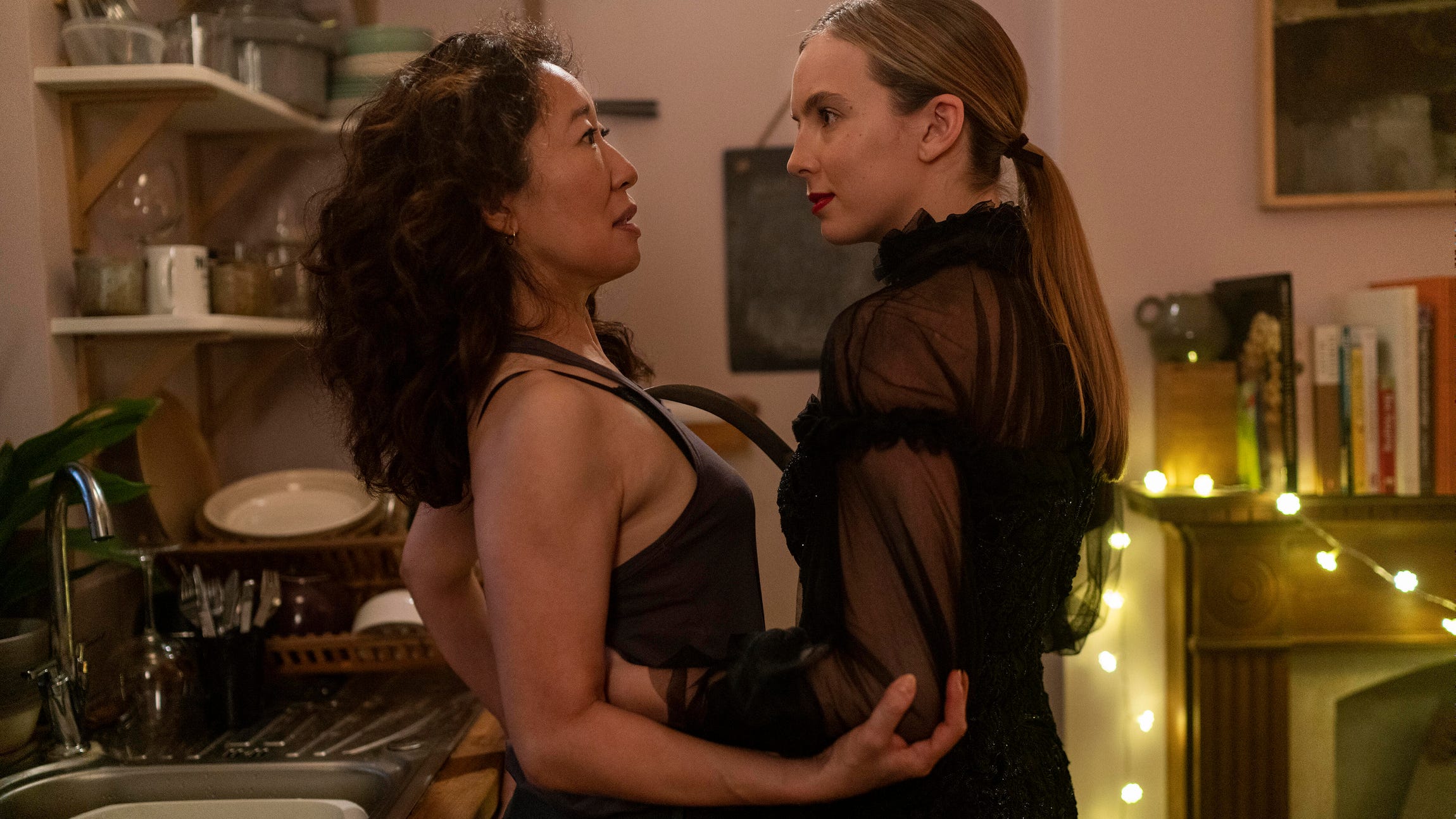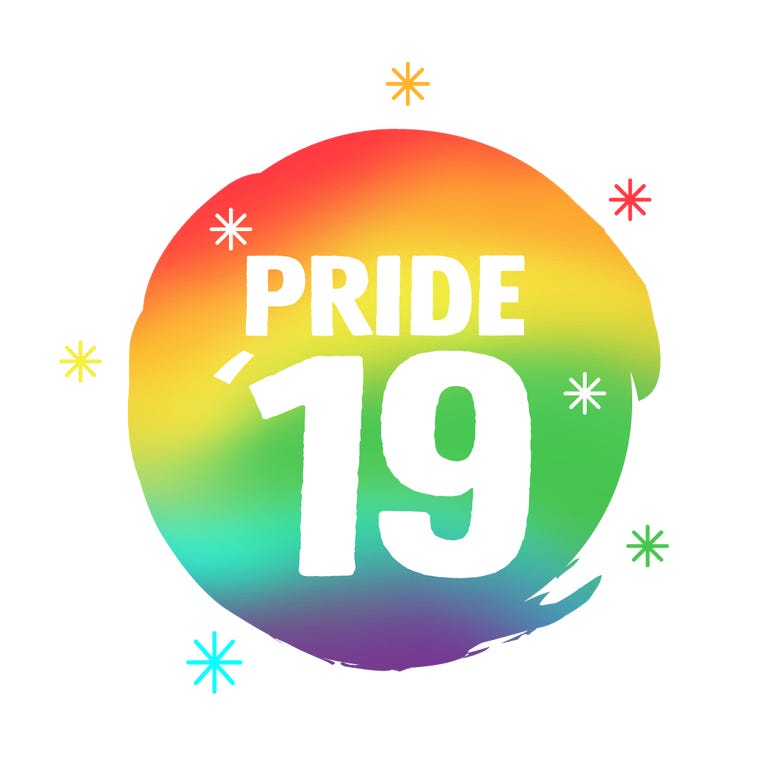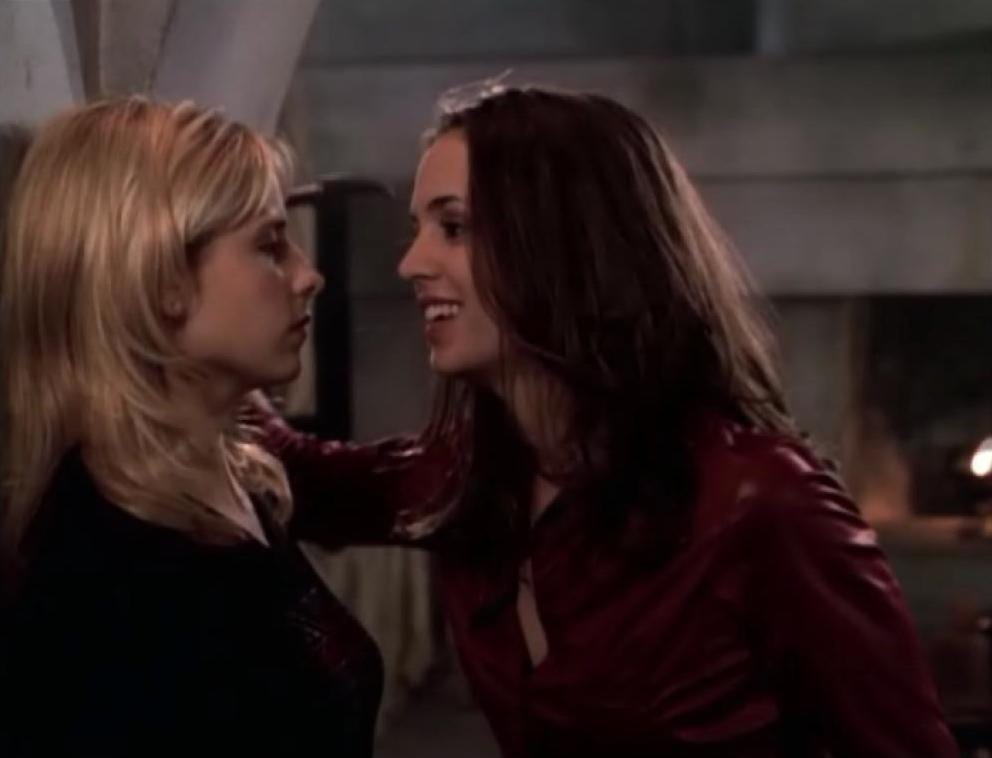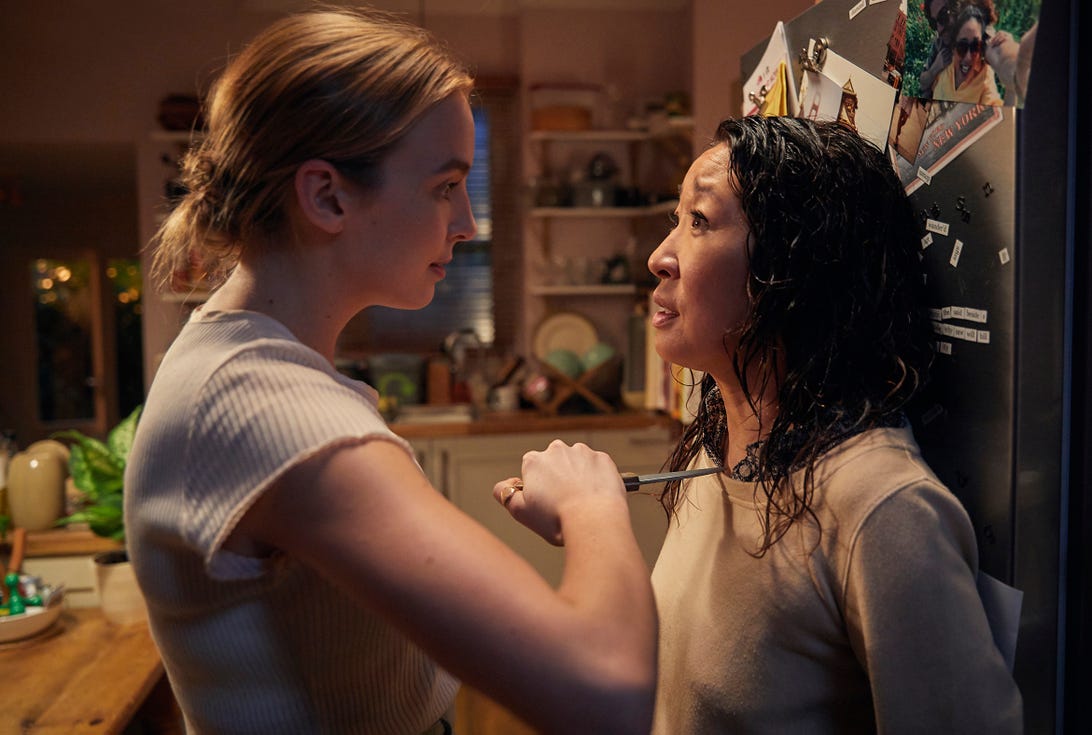
'Killing Eve' Says Out Loud What 'Buffy' Never Could About Catastrophic Queer Desire
Villanelle's sinister fixation is more honest than Faith's, but it's equally as destructive.

Thirst tweets have gotten weird lately. There's a new genre of horny on main. It has the tone of a sexual fantasy, but what it's requesting is decidedly unsexy, cartoonishly extreme violence. This is not Fifty Shades tie-me-up-and-spank-me foreplay. People on Twitter want their crushes to step on them, set them on fire, throw them off rooftops.
Although it's not unique to the LGBTQ community, there is something queer about this self-directed bloodlust. Jill Gutowitz speculated that the apparently widespread fantasy of being punched by Brie Larson "is a dark and chasmal desire that spurs from years of painstaking sexual repression." Gabrielle Paiella says of this kind of thirst that "there is no actual sexual activity involved, but it conveys a catastrophic level of desire." Catastrophic yet sexless: what a perfect encapsulation of being queer, closeted, and hopelessly in love.
me on ellen
— zoe (@latinasbi) March 7, 2019
ellen: so i heard you wanted *takes out list* charlize theron, cate blanchett, rachel weisz, sarah paulson, lena headey and rebecca ferguson to murder you
me: yeah
*they all walk in with guns and knives*
me: omg ellen you didn't
Literature has regularly blurred the lines between "girls who want to kill other girls" and "girls who want to f--- other girls," dating back at least as far as Carmilla (1872). In 1950s lesbian pulp novels, femmes fatales lure innocent girls to their destruction. "Destruction" might mean death, madness, or just really good Sapphic sex -- all were equally devastating to white middle-class heterosexual femininity. If being queer puts you in mortal peril, then the object of queer desire is both an unattainable dream and an implement of self-harm. And if loving girls is inherently dangerous, why not love dangerous girls?
The self-immolating allure of queer desire hadn't occurred to me in 1998, when Eliza Dushku joined the cast of Buffy the Vampire Slayer as the impulsive, irrepressible new Slayer, Faith. I was in sixth grade, and I didn't know I was bisexual yet, although I'm far from the only girl to have had her first glimmerings of queer awareness as a direct response to Eliza Dushku. But I knew there was something happening between Sarah Michelle Gellar's Buffy and her counterpart, something that no one would say out loud. Something sexually innocent, yet catastrophic.
Faith fought evil alongside Buffy, but they never quite made a natural team, always either out of sync or uncomfortably enmeshed. Faith sparked with a rage born of frustrated desire, a rage that quickly took her down a path of violence and chaos. Maybe she was jealous of the things Buffy had that she didn't -- a stable home life, a living Watcher, friends. That's the best explanation the narrative offers for her eventual defection to evil. But the plot has a hole in its center that never totally coalesces until you realize, of course, Faith was in love with Buffy.

Those feelings could never be safely expressed. The only physical intimacy Buffy and Faith could share was fighting side by side, and later fighting each other. They danced together once; it was beautiful and sexy and free and perfect. Then Faith pretended -- as countless queer girls have before and since -- that she was just showing off for the boys surrounding them.
Every time Buffy starts to get close to Faith, something pulls her away -- her other friends, her vampire boyfriend, her own mistrust of anything that feels too good. Faith represents abandon, leaping without looking, acting on id. When Buffy lets her own wild instincts rise up to meet Faith's, people get hurt. Without any actual f---ing, Faith is still the seductress of the lesbian pulp novel, threatening to derail Buffy's sunshiny Southern California life. And when Buffy rejects her, Faith's love curdles into something dark and consuming.
At the time I was too young to understand this violent, hungry dance, but it was the scaffolding upon which I built my understanding of love and lust between girls for years to come. Falling for another girl would destroy you. Instead of scaring me away, that only made me romanticize and crave destruction.

Twenty years after Faith swaggered into the Bronze, another queer girl with f---ed-up boundaries deigned to grace our screens, but this time the subtext has become the text. Jodie Comer's Villanelle onKilling Eve has some obvious parallels with her Slayer predecessor: a vague but traumatic past, legal difficulties, an older man telling her who to kill. Her fixation with Sandra Oh's Eve is every bit as destructive as Faith's with Buffy, but it's a great deal more honest. Faith makes a mess of her life, and everyone else's around her, because she can't admit she wants to be with Buffy; Villanelle makes a mess because it's worth it if she gets to be with Eve. (OK, and because she enjoys it.) They both have a nihilistic streak, but while Faith's is born of despair, Villanelle's is born of a twisted hope.
Like Buffy, Eve is both drawn to and repelled by her counterpart's violence. She wants to stop Villanelle, but she's also fascinated by her skill, her panache, her audacity. Villanelle embodies the ethos articulated by Faith two decades earlier: "Want, take, have." And what she wants most is Eve.
Eve wants to understand Villanelle, ostensibly to help her, but perhaps more honestly to understand and control her own darkest desires. If Eve can rein in Villanelle's destructive tendencies, perhaps she can withstand her own; Buffy hoped for something similar with Faith. Like Faith, Villanelle shuns any attempts to analyze, diagnose, or correct her. She's not interested in joining the White Hats or using her powers for a higher purpose. She just wants the gratification of surrender, whether through sex or violence -- and you can see in her excited face as she watches her victims' last breaths that those two impulses are uncomfortably close together.
I masturbate about you a lot ❤️#HowToSayILoveYou #KillingEve #Villanelle 🔪 pic.twitter.com/SBUG2Bosax
— Jana ツ (@Jana7380) September 20, 2018
Villanelle sees the darkness in Eve, and she digs it. "I've masturbated about you a lot," she says when they're finally face to face. The first time she meets Buffy, Faith says "Isn't it crazy how slaying always makes you hungry and horny?" Eve and Buffy are both taken aback, but you see something flicker in their eyes: Yes, I know you, you're like me. You're the parts of me I don't want to name or acknowledge.
To be a queer woman is often to lust after your shadow self, to find over and over that who you want overlaps uncomfortably with who you want to be: as the poet Daphne Gottlieb puts it, "I don't know/whether I want/to be/her, fuck her/or borrow her clothes." There's a wrongness to the intimacy that grows between these fictional women, who understand each other so much better than the opposing powers they ostensibly serve. It's a sensuous kind of trespass, as we see when Eve wears the dress Villanelle gave her. Is it a gift or a threat? She looks beautiful; Eve runs her hands over her body, discovering what Villanelle already knew was there. Faith's eyes sparkle with approval when Buffy comes to kill her. "Look at you," she says. "All dressed up in big sister's clothes."

The climax of Killing Eve Season 1 parallels the final showdown between Buffy and Faith so neatly it's hard to believe it isn't intentional. After weeks of cat-and-mouse games, Eve finally tracks down Villanelle's apartment. (Buffy arrives at Faith's door.) They face each other at last, finally admitting their mutual fascination. (They face each other at last, preparing to fight.) The walls between them shatter, and they lie down side by side on Villanelle's bed. (They shatter a giant window and land side by side on Faith's balcony.) Villanelle sees her own knife in Eve's hand. (Faith sees her own knife in Buffy's hand.) "That's rude," Villanelle says. ("That's mine," Faith says.) And the knife goes into her belly. (And the knife goes into her belly.)

The death-by-thirst-object fantasy is one of utterly one-sided intimacy, offering up total bodily submission without requiring any vulnerability in return. The fantasist is annihilated by the intensity of their desire while the fantasy is unchanged, often literally untouched ("run me over with a truck," "kill me with a sword"). But Buffy and Eve both realize, in the moment they draw blood, that there is no such thing. Violence doesn't break these bonds; it only tangles them further. Faith and Villanelle are not, in fact, destroyed. These unspeakable feelings can't be purged in a single moment. This love leaves scars.
In 2019, we're supposed to want healthy, positive queer representation in our fiction: stable relationships, possibility models. But being queer is still dangerous, even here, even now. Admitting desire still feels, sometimes, like wielding a weapon. Buffy hinted at this, perhaps unintentionally, but Killing Eve says it right out loud. It might not be aspirational, but it speaks to something with deep roots in me and many other queer women. It's for all of us who have looked into a beautiful face and thought, "This could be how I die."
This article was originally published June 10, 2019. Lindsay King-Miller's writing has appeared in Glamour Magazine, The Guardian, Them.us, Vice.com, and numerous other publications. She lives in Denver with her partner, their two children, and an absolutely terrible cat. She is the author of Ask A Queer Chick: A Guide to Sex, Love, and Life for Girls who Dig Girls (Plume, 2016).